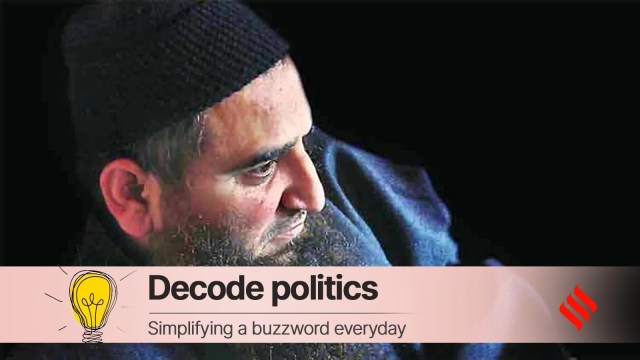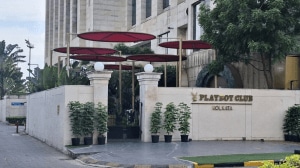“This organisation and its members are involved in… supporting terrorist activities and inciting people to establish Islamic rule in J&K. The PM @narendramodi government’s message is loud and clear, that anyone acting against the unity, sovereignty and integrity of our nation will not be spared and face full wrath of the law,” Union Home Minister Amit Shah posted on X.

How many J&K separatist organisations are banned?
The Muslim League is the fifth separatist organisation banned by the Centre since 2019.
Story continues below this ad
The Dukhtaran-e-Millat (DeM), a women’s separatist organisation, was declared a “terrorist organisation” under Section 35 of the UAPA in 2018. In February the following year, the Jamaat-e-Islami (Jammu and Kashmir) and the Jammu and Kashmir Liberation Front (JKLF) were banned under the UAPA’s Section 3 dealing with “unlawful association”. And in October this year, the Centre banned the Jammu and Kashmir Democratic Freedom Party for engaging in “anti-India” activities.
What is their link to Hurriyat Conference?
Out of these five banned organisations, four were part of the separatist grouping called the Hurriyat Conference founded by separatist patriarch Syed Ali Geelani in 2003.
The Hurriyat Conference itself is a faction of the larger Hurriyat grouping. In the winter of 1992, when militancy was at its peak in Kashmir, separatists felt the need for a political platform that would complement the militant movement and seek a resolution of the Kashmir issue. This led to the formation of the All Parties Hurriyat Conference (APHC), an amalgam of separatist political outfits.
From 1993 until 1996, the Hurriyat was the dominant political force in Kashmir, with mainstream political leaders having withdrawn. While the National Conference returned to the political scene during the 1996 Assembly elections, the Hurriyat stayed afloat, with alleged backing from Pakistan.
Story continues below this ad
After over a decade, the alliance started crumbling within, struggling to keep its flock together with its disparate ideologies, from moderates like Mirwaiz Umar Farooq and Abdul Gani Lone to hardliners like Syed Ali Geelani and Masarat Alam. Their differences over future strategy, role of militancy, and dialogue with New Delhi, were out in the open.
The 2002 Assembly elections finally led to a split. The hardline group led by Geelani accused Sajad Lone, representing People’s Conference after his father’s assassination, of fielding proxy candidates in the elections.
The Hurriyat then split into the Mirwaiz and Geelani camps. The Muslim League was in the Geelani camp.
The Jammu and Kashmir Liberation Front was not part of either of the two factions of Hurriyat.
Why is Masarat Alam in cross-hairs of govt?
Story continues below this ad
A resident of Old Srinagar, Alam was a student of the Valley’s reputed Biscoe School. He first popped up in the police radar as a teenager when he joined the militant movement in 1990. Arrested soon after, Alam spent more than two years in jail, and on release, formed the Muslim League, which soon became a constituent of the then united Hurriyat Conference.
In 2007, Alam made a mark by organising a massive rally for Geelani in Old Srinagar, then the stronghold of his rival and moderate Hurriyat leader Mirwaiz Umar Farooq.
Three years later, when Geelani was arrested, Alam took to the streets and spearheaded a public uprising that crippled the Valley for more than three months. During this time, he was seen to have choreographed an anti-Indian government dance that came to be known as “ragda”. An estimated 120 civilians were killed in firing by government forces on protesters during this time.
Since April 2015, Alam has been in continuous detention. In his three decades of political career, Alam has been booked in at least 27 cases, with most of his time in prison accounted for by the invocation of the Public Safety Act (PSA) against him a record 37 times. He is currently in detention in Tihar Jail in Delhi, after the NIA booked him in a money laundering case.
Story continues below this ad
Since Geelani’s death in 2021, Alam has also been chairman of the Hurriyat Conference.

































